Patient Empowerment Program: A Rare Disease Podcast
Join the nano-rare disease community! Interviews features leading physicians, scientists, biotech experts, and patient advocates. Lessons teach core concepts about drugs. Our host Dr. Crooke has led the creation of antisense technology and his foundation, n-Lorem, is using this powerful technology to discover, develop, and provide personalized experimental antisense oligonucleotide medicines to nano-rare patients for free, for life. n-Lorem is a non-profit organization established to apply the efficiency, versatility and specificity of antisense technology to charitably provide experimental antisense oligonucleotide (ASO) medicines to treat patients (less than 30 patients) that are the result of a single genetic defect unique to only one or very few individuals. The advantage of experimental ASO medicines is that they can be developed rapidly, inexpensively and are highly specific. n-Lorem was founded by Dr. Stan Crooke, who founded IONIS Pharmaceuticals in 1989 and, through his vision and leadership, established the company as the leader in RNA-targeted therapeutics. The podcast is produced by n-Lorem Foundation and hosted by Dr. Stanley T. Crroke, who is the Founder, CEO and Chairman. Our videographer is Jon Magnuson. Our producers are Kira Dineen, Jon Magnuson, Kim Butler, and Amy Williford. To learn more about n-Lorem, visit nlorem.org. Contact us at podcast@nlorem.org.
Episodes
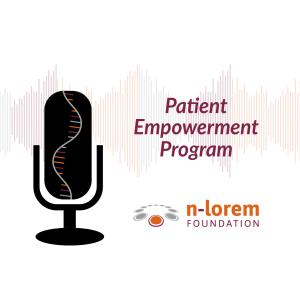
Wednesday Feb 05, 2025
Wednesday Feb 05, 2025
Sloane was born with a KIF1A mutation and is a special case at n-Lorem—she was the first patient to receive a medicine originally designed for someone else. Her mother, Megan, and grandfather, Tom, join the Patient Empowerment Program to share her journey and provide an update on how she’s doing six months after treatment.
On This Episode We Discuss:
Sloane’s KIF1A diagnosis
Nano-rare diseases affect the entire family
Sloane was able to use the same ASO as another KIF1A patient
Finding n-Lorem through KIF1A.ORG
Shocked that n-Lorem was able to create personalized treatments efficiently at cost
Sloane’s case is unique in a variety of ways and the decision to treat
How Sloane has responded to treatment
Are better measurements of benefit needed for nano-rare patients?
How Sloane has brought empathy, joy, and positivity to her family
Tom unretired to help fund research and support
The origins of ASO medicine is a long haul
Thank you to Hongene Biotech for sponsoring this patient story episode!
Make Hope Possible for nano-rare patients with a donation to n-Lorem.
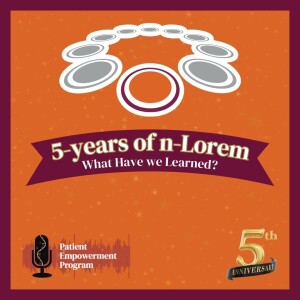
Wednesday Jan 22, 2025
Wednesday Jan 22, 2025
Five years of creating medicines, instilling hope, and overcoming steep challenges—all with the singular goal of improving the lives of nano-rare disease patients. Along the way, we’ve proven that WE CAN treat these patients safely and effectively, delivering significant benefit. But what else have we discovered throughout this journey?
Thank you to Hongene Biotech Corporation for sponsoring this 5-Year Anniversary episode. On This Episode We Discuss:
- We CAN do this
- n-Lorem is proof of the value of investing in science
- We can treat nano-rare patients safely
- The nano-rare patient population is large
- We must introduce genomic sequencing into newborn evaluation
- Most nano-rare diseases are more prevalent than we think
- Most diseases are a composite of multiple mutations in one or more genes
- A non-profit model in which patients are treated irrespective of their financial status is feasible
- Nano-rare mutations are spread throughout the genome
- Nano-rare mutations can affect any organ
- Essentially all types of mutations can cause nano-rare diseases
- Most nano-rare patients express severe, chronic, debilitating, progressive diseases
- The journey to diagnosis is often unique, long, and perilous
- Significant benefit can be achieved
- ASOs administrated intrathecally for CNS diseases can result in profound benefit - ASOs can result in durable benefit
- Many patients require allele-selective ASOs
- The community is strong
- Industrialized processes created by n-Lorem is delivering great value
- The modified cross-over clinical design created by n-Lorem is delivering high quality data
- If we raise the funds, we can meet the demand Donate: www.nlorem.org/donate
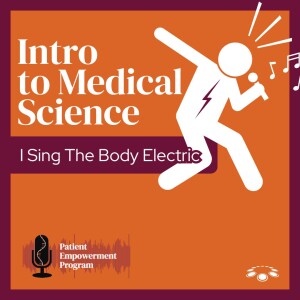
Wednesday Jan 08, 2025
Wednesday Jan 08, 2025
Walt Whitman’s 1855 poem, I Sing the Body Electric, is a celebration of the human body and its intrinsic connection to the universe. During that era, scientists were just beginning to understand that humans are, indeed, electrical beings. Whitman’s deliberate use of the word "electric" in his tribute to the human body was quite remarkable, as the term was not widely used at the time and electricity for human use was still in the experimental stage. With that in mind, the poem’s title serves as both a poetic and scientific statement.
Many have compared great science to art, but we believe it is more akin to poetry. A poet distills intricate concepts, stories, and emotions into the most concise, impactful expression—cutting through the noise to reach the heart and soul of the matter. Similarly, great scientists achieve this with their work. Together, scientists and patients contribute their own verses to the epic poem of understanding known as science.
This episode of the Patient Empowerment Program podcast is proudly sponsored by Hongene Biotech. With more than 26 years of experience in the nucleic acid industry, Hongene is a specialized CDMO and raw materials supplier committed to providing high-quality and high value products and services with the best in class lead times.
Make Hope Possible and donate, today www.nlorem.org/donate
Episode sponsor: Hongene Biotech https://www.hongene.com/
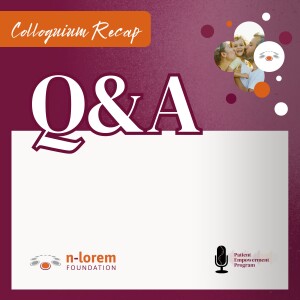
Wednesday Dec 18, 2024
Wednesday Dec 18, 2024
Join Stan Crooke, n-Lorem founder, CEO, and host of the Patient Empowerment Program Podcast, alongside Amy Williford, Sr. Director of Communications and Donor Relations, for a special episode.
In this post-colloquium Q&A, Stan recaps the 2024 Nano-rare Patient Colloquium and the progress n-Lorem has made as the organization nears its 5-year anniversary, shares his candid reflections on the event, and dives into additional thoughts and questions that weren’t covered.
Do you have additional questions? Email podcast@nlorem.org.
Question Bank:
2:15 How do you think the event went this year?
6:05 Were observations of benefit expected in patients so quickly?
9:47 What do you expect the number of patients treated to be next year?
10:57 Do you have a message to supporters?
12:30 Were there any disappointments from the colloquium?
13:21 What are the most important things that n-Lorem has learned this year?
16:13 Do you think n-Lorem’s processes will be outlined every year at the event?
18:05 How is AI incorporated at n-Lorem?
19:10 Does your recently announced deal with GondolaBio reflect the sustainability strategy discussed at the event?
20:53 n-Lorem is celebrating 5 years in 2025. Did you expect the foundation to be where it is today?
21:28 Does n-Lorem plan to expand into Europe and elsewhere?
Make hope possible with a donation.
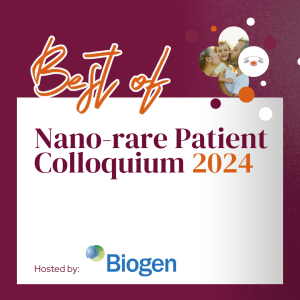
Wednesday Dec 04, 2024
Wednesday Dec 04, 2024
This year’s Colloquium spanned two perfect autumn days in beautiful Cambridge, Massachusetts where hundreds of nano-rare community members from around the world gathered under a single roof to learn, connect, and support one another. We’re pleased to announce that the event welcomed over 750 attendees, both in-person and virtually. It’s each and every one of you who made the event such a success! For this special episode, we gathered the ‘Best’ clips from the event for you to learn from and enjoy.
To submit questions for our upcoming Q&A episode, email podcast@nlorem.org. We can’t wait to hear from you!2024 Colloquium Recap
On this episode:
2:07 Daphne Graskewicz-Prado, ASO The Perilous Journey to Diagnosis and Treatment for Nano-rare
9:35 Ryan Strankowski and Dr, Nelson Leung, Ryan’s Journey and Clinical Experience
15:55 Luke Rosen, Megan Hedstrom, and Dr. Jennifer Bain, Susannah’s & Sloane’s Journeys and Unique Clinical Experiences
21:49 Kelley Dalby and Dr. Olivia Kim-McManus, Connor’s Journey and Clinical Experience
30:00 Dr. Julie Ziobro and Dr. Horacio Kaufmann, Building a Nano-rare Network and Managing Institutional Challenges
37:38 Dr. Andrew Lo and Dr. Alan Lotvin, Innovative Ways to Support Nano-rare
42:30 Dr. Toby Ferguson, Dr. Liz Berry-Kravis, and Dr. Eugene Shneider, Changing the World One Patient at a Time
47:30 Dr. Kate Dawson, What It Means to be a Parter with n-Lorem for Nano-rare
50:23 Dr. Stanley Crooke, Providing Hope for a Better Future, One Nano-rare Patient at a Time
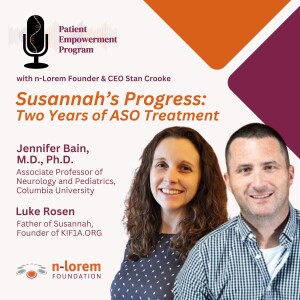
Wednesday Oct 16, 2024
Wednesday Oct 16, 2024
Two years of treatment—two years of strength, courage, and blazing a trail for other nano-rare patients! 🎉 Susannah's story was the first shared on the Patient Empowerment Program podcast. Now, two years later, her father, Luke Rosen, and her physician, Dr. Jennifer Bain, detail Susannah’s remarkable progress since beginning regular treatments—highlighting improvements in her motor skills, cognition, energy, and more!
Susannah's Story (May 25, 2022)
Donate
2024 Nano-rare Patient Colloquium
On This Episode We Discuss:
3:10 Susannah's KIF1A mutation
5:50 Luke and his wife Sally changed their careers to help find a treatment for KIF1A
7:23 How Susannah's family first heard of n-Lorem
8:43 Jen on the Columbia University Medical Center team and the decision to treat Susannah
12:25 Luke's experience bringing his daughter to receive an experimental ASO treatment for the first time
14:30 The positive outcomes and observations of Susannah's treatment
26:15 What Dr. Bain has learned since treating Susannah
29:15 Luke on the impact and importance of the little things
31:15 Advice to other parents
35:40 Being part of a community of nano-rare patients and families

Wednesday Oct 02, 2024
Wednesday Oct 02, 2024
Take a glimpse behind the curtain as we offer you a sneak peek of the 2024 Nano-rare Patient Colloquium. We’re thrilled to welcome back longtime biotech journalist and current Features Editor of The Transmitter, Brady Huggett, to the podcast. In an interview with n-Lorem founder and CEO Stan Crooke, they preview the upcoming Colloquium, diving into key topics that will shape the conversation at the event and around nano-rare diseases in the year ahead.On This Episode We Discuss:
2:21 How many Investigational New Drugs (INDs) has n-Lorem filed?
5:22 How many patients treated with an n-Lorem ASO have been on therapy long enough to observe a benefit?
6:50 What does it mean for a patient like Susannah who has experienced a significant decrease in behavioral arrest incidents since receiving treatment
9:39 Providing ASOs to patients earlier
13:25 INDs for the ‘n-of-few'
23:15 Introducing Whole Genome Sequencing (WGS) for all newborns
29:05 Stan’s perspective on leadership
33:50 n-Lorem's goals for the 2024 Nano-rare Patient Colloquium
Register for the 2024 Nano-rare Patient Colloquium Donate
Biogen.com
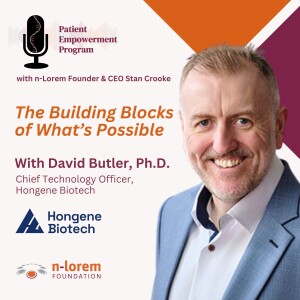
Wednesday Sep 18, 2024
Wednesday Sep 18, 2024
Hongene Biotech is a producer of RNA building blocks – the first step for what’s possible in RNA drug-discovery and development. David Butler, Ph.D., Chief Technology Officer of Hongene, joins the Patient Empowerment Program to discuss why Hongene aims to help make RNA medicines accessible and affordable for patients everywhere, regardless of prevalence.
On this episode we discuss:
2:40 Hongene Biotech and what do they do
8:09 The early days of nucleoside building blocks and maturation of Hongene
12:00 Hongene is a strong supporter of n-Lorem. Why?
15:30 David’s origins in the chemistry field
17:38 Incremental progress that has been made in science and manufacturing
Links:
2024 Colloquium - https://www.nlorem.org/nano-rare-patient-colloquium-2024/
Make Hope Possible with a Donation - https://www.nlorem.org/donate/
Hongene - https://www.hongene.com/
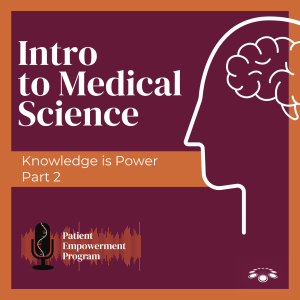
Tuesday Sep 03, 2024
Tuesday Sep 03, 2024
The concluding episode of the Knowledge is Power series. The knowledge we are gaining at n-Lorem has even more value than benefiting nano-rare patients and their families. These insights will enable scientists to discover new therapeutic targets for both common and rare diseases, fundamentally changing the way we approach health and disease.
Survey – Patient Empowerment Program Podcast
Register for the 2024 Nano-rare Patient Colloquium
On This Episode We Discuss:
Questions we can answer and teach us about health and disease and opportunities to treat more common diseases
What are all the functions of human genes?
Are there gene products that have redundant functions?
Do identical mutations cause identical phenotypes?
n-Lorem can demonstrate that ASOs work on general types of disease challenges
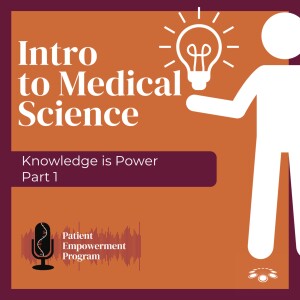
Wednesday Aug 21, 2024
Wednesday Aug 21, 2024
The knowledge we are gaining at n-Lorem has even more value than benefiting nano-rare patients and their families. These insights will enable scientists to discover new therapeutic targets for both common and rare diseases, fundamentally changing the way we approach health and disease.Survey – Patient Empowerment Program PodcastRegister for the 2024 Nano-rare Patient ColloquiumOn This Episode We Discuss:Two most common words in medicine: Health and DiseaseThe Scientific MethodThe Importance of Single VariablesOrthogonal ThinkingWe Are at a Unique Moment in Medical HistoryGenomicsAdvances in OmicsBiological Networks and AIFacile Collection, Maintenance, Growth and Differentiation in the LabAntisense Technology

